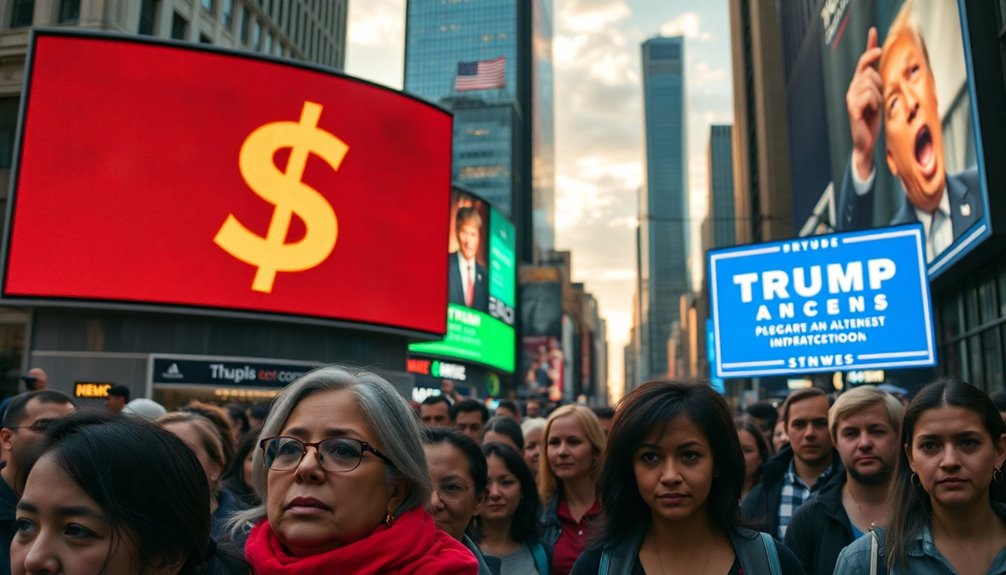Trump's policies are speeding up global de-dollarization by encouraging countries to look for alternatives to the US dollar. As you might notice, the share of the dollar in foreign reserves has dropped significantly, and the Chinese renminbi is gaining ground. This shift in currency dynamics is driven by a preference for local-currency settlements in trade. Additionally, emerging markets consistently explore different currencies, further sidelining the dollar. As these trends unfold, you'll find that the implications of such economic changes extend beyond currency shifts, creating a fascinating narrative about the future of global finance.
Key Takeaways
- Trump's policies have contributed to a declining US dollar reserve share, dropping from 72% in 2002 to 59% in 2023.
- Increased preference for local-currency settlements in trade may accelerate de-dollarization amid anticipated dollar weakening.
- Emerging market currencies are gaining prominence, especially in trade and finance among the global South.
- Political instability and economic policies during Trump's tenure have led to currency volatility, impacting investor confidence in the dollar.
- Legal challenges and potential resistance to Trump's orders could further complicate the US's economic landscape, influencing global currency dynamics.
Global Currency Shifts Underway

As the world shifts toward a more multipolar economic landscape, you might notice significant changes in global currency dynamics.
The US dollar's dominance is waning, with its share of foreign-exchange reserves dropping from 72% in 2002 to 59% in 2023. This decline is fueled by the rising use of non-traditional currencies, particularly the Chinese renminbi, and a growing preference for local-currency settlement in trade. Additionally, the anticipated weakening of the dollar's outperformance could further accelerate these shifts.
Emerging market currencies are also gaining traction as global South nations redefine trade and finance. These shifts reflect a broader trend toward currency competition, where diversification of reserves offers economic advantages.
As you observe these developments, remember that the future of currency may not be as dollar-centric as it once was.
Legal Challenges Intensify for Trump

While Trump's policies ignite fierce debate, legal challenges against him are mounting rapidly.
State and local officials are stepping up, with governors and Attorneys General key players in filing lawsuits that often leverage constitutional and statutory arguments. Additionally, as federal employees may face pressure to comply with presidential directives, they could resist illegal orders, leading to more complex legal battles that highlight the conflict between the Unitary Executive Theory and separation of powers principles.
Progressive nonprofits, like Democracy Forward, are rallying over 800 lawyers to develop and litigate challenges. They're providing pro bono support for those affected by proposed policies.
The ACLU is also on the front lines, targeting Project 2025 and defending civil rights through detailed memos and community organizing.
Anticipated lawsuits could emerge swiftly after Executive Orders or agency actions, with federal employees ready to appeal decisions through the Merit Systems Protection Board, further intensifying the legal landscape for Trump.
Currency Exchange Rate Fluctuations

Currency exchange rate fluctuations can significantly impact your financial decisions, whether you're an investor or a consumer. These fluctuations are driven by various factors, including interest rates, economic data, and political stability. For instance, higher interest rates can attract foreign capital, increasing demand for your currency. Strong economic indicators enhance investor confidence, while political turmoil can lead to currency depreciation. Additionally, inflation rates play a crucial role; low inflation typically supports a stable currency, while high inflation erodes purchasing power. Currency fluctuations are a fundamental aspect of the foreign exchange market and are essential for international trade and investment considerations. If you're involved in global trade, a weaker currency can make your exports cheaper and more competitive. Understanding these dynamics helps you navigate the complexities of currency values and their effects on your financial strategy.
Central Bank Digital Currencies

With the rise of digital technology, central bank digital currencies (CBDCs) are emerging as a crucial innovation in the financial landscape. A CBDC is digital money issued by a central bank that complements cash, aiming to provide a stable and secure payment system. You can expect real-time transactions that reduce costs, especially for cross-border payments, which could drop to 0%. This move also promotes financial inclusion, particularly in developing economies. Additionally, CBDCs could ensure all citizens receive timely government support during economic crises. However, implementing CBDCs poses challenges, like technological investment and privacy protection. As 134 jurisdictions explore CBDCs, they may reshape the global economy, potentially competing with cryptocurrencies and altering the relationship between central banks and consumers. The shift toward CBDCs is part of the broader trend of de-dollarization.
Election Campaigns and Currency Impact

Election campaigns can significantly impact a nation's currency, often leading to volatility and unexpected devaluations. In recent years, countries like Nigeria, Turkey, and Indonesia have faced sharp currency drops shortly after elections.
Governments usually bolster their currencies before elections by depleting foreign exchange reserves, only to devalue post-election. For instance, Nigeria's naira plummeted by 49% within two weeks after its February 2023 presidential election. This pattern reflects a political business cycle, where short-term fiscal expansions boost popularity, but long-term consequences like inflation and debt emerge. Additionally, emerging markets and developing economies have shown a trend of post-election currency devaluations, exacerbating economic challenges.
Emerging markets, in particular, suffer from exchange rate volatility, complicating their ability to manage dollar-denominated debt and increasing inflation risks.
Ultimately, election cycles can destabilize currencies and economies alike.
Emerging Market Currency Trends

Emerging market currencies are navigating a landscape marked by significant volatility and unpredictability. You'll notice sharp fluctuations, especially with looming Federal Reserve rate cuts in 2025 that could strengthen the US dollar, creating headwinds for these currencies. The incoming Trump administration's tariffs and deregulation promises may further weaken them, as seen with the Indian rupee and Brazilian real reaching record lows. Economic risks loom large, with lower global trade volumes and rising US bond yields stress-testing fiscal positions. However, there are diversification opportunities too. Local currency bonds offer attractive yields, historically providing a premium over developed market debt. As geopolitical factors push for de-dollarization, emerging markets must adapt quickly to survive and thrive in this shifting environment. Additionally, analysts predict that the Fed's slow rate cut pace may exacerbate challenges for these currencies in the coming months.
Frequently Asked Questions
How Do Trump's Policies Affect Everyday Consumers' Purchasing Power?
Trump's policies can significantly impact your purchasing power.
Tax cuts might initially boost your disposable income, increasing consumer spending. However, rising tariffs could raise prices on everyday goods, like electronics and footwear, forcing you to spend more for the same items.
As prices climb, you may find yourself cutting back on discretionary purchases, leading to a squeeze on your overall budget and reducing your ability to buy what you need.
What Are the Long-Term Implications of De-Dollarization for the U.S. Economy?
Have you ever considered how a world without a dominant dollar might impact you?
De-dollarization could lead to a weaker dollar, increasing import costs and potential inflation. As borrowing becomes pricier, businesses and individuals might struggle to access capital.
This shift could also foster greater currency competition, altering global trade dynamics.
In the long run, you might notice changes in consumer prices and investment opportunities as the U.S. economy navigates this new landscape.
How Does Global De-Dollarization Impact International Trade Agreements?
Global de-dollarization impacts international trade agreements by shifting how countries transact.
You'll notice nations increasingly favor local currencies, reducing reliance on the US dollar. This trend can enhance trade efficiency and lower transaction costs.
However, it also introduces risks, like currency volatility. As more countries adopt alternative currencies, you'll see a potential shift in power dynamics and negotiation strategies, fundamentally altering how international trade is conducted in the years to come.
What Role Do Cryptocurrencies Play in the Future of Global Currencies?
Imagine a world where your money dances freely, unchained from borders and bureaucracies.
Cryptocurrencies play a crucial role in this future, offering a decentralized alternative that empowers you to transact globally with ease. They promise financial inclusivity, allowing everyone access to banking services. Moreover, the rise of cryptocurrencies also brings about a new level of transparency and security, as blockchain technology enables secure transactions without the need for traditional intermediaries. However, investors must also consider various factors that influence the market, such as economic indicators and financial trends. For instance, understanding the cpi and ppi impact on cryptocurrencies can provide valuable insights into how inflation and production costs may affect the value and adoption of digital currencies in the long run.
With low costs and enhanced security, you can navigate volatile economies seamlessly. As traditional currencies face challenges, digital currencies might just become the new lifeline for international trade and economic growth.
How Can Individuals Protect Their Wealth Amid Currency Fluctuations?
To protect your wealth amid currency fluctuations, diversify your investments across different currencies and markets.
This minimizes currency risk and offers a safety net against economic downturns.
Consider using hedging strategies like forward contracts or currency ETFs to lock in rates and mitigate exposure.
Stay informed about tax regulations to optimize your tax strategies, and secure comprehensive insurance and estate planning to safeguard your assets for the long term.
Conclusion
In light of the shifting global currency landscape, you can see how Trump's policies might accelerate de-dollarization. As central banks explore digital currencies and emerging markets adapt, it's crucial to stay informed. The theory that these changes could reshape the economic balance holds merit, especially with legal challenges looming and election campaigns underway. By understanding these dynamics, you can better navigate the potential impacts on your finances and investments in the coming years.









